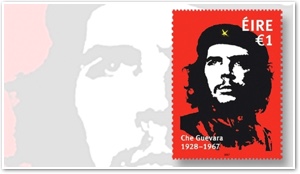The Way of Che
- THEODORE DALRYMPLE
The Irish Post Office has issued a stamp to commemorate the fiftieth anniversary of the death of Ernesto Guevara.
 This is, presumably, because he was both very famous and had some distant Irish ancestry. It is, however, a rather sinister philosophy that the worth of a man's work or ideas, or his influence on the world, is much affected, either for the better or the worse, by his distant ancestry.
This is, presumably, because he was both very famous and had some distant Irish ancestry. It is, however, a rather sinister philosophy that the worth of a man's work or ideas, or his influence on the world, is much affected, either for the better or the worse, by his distant ancestry.
Guevara's reputation is, of course, the triumph of marketing over truth and reality. There is probably no resort of mass tourism in the world where Guevara kitsch is not on sale and, one must presume, bought; and in an odd way this is only appropriate, for mass tourism makes lemmings seem like unreconstructed individualists, and Guevara was nothing if not an ardent promoter of mass conformity and unthinking obedience. Like many an adolescent psychopath, as he remained all his life, he dreamed of making mankind anew — not in his own image, exactly, for he thought of himself as a leader rather than a follower, but according to his own far-from-profound ideas of what mankind should be. The triumph of marketing is to have made this apostle of the most complete servitude into an apostle of the most complete freedom.
The triumph of marketing is to have made this apostle of the most complete servitude into an apostle of the most complete freedom.
The triumph of marketing over truth and reality is nothing new, however. To expect people who are trying to sell you something also to tell you the truth, the whole truth, and nothing but the truth is to expect what never did happen and what never will happen. The buyer will always have to beware, no matter what legal protections are put in place for the unwary; the necessity is inscribed, as it were, in human nature itself.
A few years ago, I did some research on three early Victorian murders that caused me to read several provincial newspapers of the time. I discovered incidentally to my research that the owners or editors of about half of the British provincial newspapers also sold patent medicines; and this made perfect sense, for by far the greatest advertisers in provincial newspapers were the manufacturers of patent medicines. The owners or editors of the newspapers sold advertisements to the producers of patent medicines, then they sold the newspapers in which the advertisements appeared, and finally they sold the products themselves to the readers. It was an excellent example of rational commercial synergy. (About half of the medicines, by the way, were either to cure or to prevent syphilis — a disease, then, that was a great support to the press of the time.)
Now, the principal quality or characteristic of the sellers of patent medicine has always been effrontery, that is to say the blatant insinuation of the false. Thomas Holloway's innovation was to insinuate such falsehood on a mass or industrial scale. There was hardly a newspaper in which he did not place a weekly advertisement; moreover, he pioneered the advertisement that masquerades as news story. He would ensure that reports of miracle cures in faraway places, supposedly wrought by his pills and ointment, and written as matter-of-factly as possible, were placed in every newspaper, reports whose veracity no one could possibly check for himself, of course.
She spoke in pure, unadulterated clichés, practically contentless, but with such force of conviction that, if you discounted what she actually said, you might have thought that she was a person of profound insight with a vocation for imparting it to others.
As Napoleon once said, repetition is the only rhetorical technique that really works — besides which hope and fear render people susceptible to effrontery. In Thomas Holloway's time, the fear of illness was often, and the hope of cure rarely, justified; at least Holloway's preparations were unlikely to do much harm (they contained aloe, myrrh, and saffron), unlike the prescriptions of the orthodox doctors of the time. They allowed for the possibility of natural recovery, whereas orthodox medicine often hurried its consumers into their graves. Nevertheless, the claims Holloway made for his ointment and pills were preposterous, and something is not curative just because it fails to kill.
Holloway made an immense fortune by his effrontery and founded a women's college in the University of London on the proceeds.
Since his day (he lived from 1800 to 1883, dying in the same year as Karl Marx), effrontery has made great strides as a key to success in life, and indeed quite ordinary people now employ it routinely. There are consultants in effrontery training who not only commit it themselves but teach others how to commit it, and charge large sums for doing so. There was a time when self-praise was regarded as no praise, rather the reverse; but now it is a prerequisite for advancement.
The other day I was sent a video of a young woman — elegant, attractive, and very self-confident — giving a seminar on how other young women, one of them the daughter of a friend, could and should change their lives for the better. In a way, I admired the leader of the seminar's effrontery (just as I secretly admire Thomas Holloway's). She spoke in pure, unadulterated clichés, practically contentless, but with such force of conviction that, if you discounted what she actually said, you might have thought that she was a person of profound insight with a vocation for imparting it to others. Her audience was as lambs to the slaughter, or at least to the fleece; they had paid a large sum of money to listen to mental pabulum that would make the recitation of a bus timetable seem intellectually stimulating.
But was not my own surprise at their gullibility a manifestation of my own gullibility, in supposing that intelligence and education make a man wise, rather than more sophisticated in his foolishness?
On catching glimpses in the past of American television evangelists, it was always a cause of wonderment to me that anyone could look at or listen to them without immediately perceiving their fraudulence. This fraudulence was so obvious that it was like a physical characteristic, such as height or weight or color of hair, or alternatively like an emanation, such as body odor (incidentally, pictures of Guevara always suggest, to me at any rate, that he smelled). How could people fail to perceive it? Obviously, many did not, for the evangelists were very successful — financially, that is, the only criterion that counted for them.
But at least most of their victims were uneducated, relatively simple folk.
Whereas the attendees of the seminar of which I saw a video clip were well educated, and still they did not perceive the vacuity, and therefore the fraudulence, of the seminar that they attended at such great expense to themselves.
But was not my own surprise at their gullibility a manifestation of my own gullibility, in supposing that intelligence and education make a man wise, rather than more sophisticated in his foolishness?
 This is Meaghen Gonzalez, Editor of CERC. I hope you appreciated this piece. We curate these articles especially for believers like you.
This is Meaghen Gonzalez, Editor of CERC. I hope you appreciated this piece. We curate these articles especially for believers like you.
Please show your appreciation by making a $3 donation. CERC is entirely reader supported.

Acknowledgement
 Theodore Dalrymple. "The Way of Che." Taki's Magazine (October 28, 2017).
Theodore Dalrymple. "The Way of Che." Taki's Magazine (October 28, 2017).
Reprinted with permission of Theodore Dalrymple.
The Author

 Theodore Dalrymple is a former psychiatrist and prison doctor. He lives in France and is the author of, The Terror of Existence: From Ecclesiastes to Theatre of the Absurd, The Proper Procedure and Other Stories, Out Into The Beautiful World, Admirable Evasions: How Psychology Undermines Morality, Spoilt Rotten: The Toxic Cult of Sentimentality, Farewell Fear, Our Culture, What's Left of It: The Mandarins and the Masses, Life at the Bottom: The Worldview That Makes the Underclass, and So Little Done.
Theodore Dalrymple is a former psychiatrist and prison doctor. He lives in France and is the author of, The Terror of Existence: From Ecclesiastes to Theatre of the Absurd, The Proper Procedure and Other Stories, Out Into The Beautiful World, Admirable Evasions: How Psychology Undermines Morality, Spoilt Rotten: The Toxic Cult of Sentimentality, Farewell Fear, Our Culture, What's Left of It: The Mandarins and the Masses, Life at the Bottom: The Worldview That Makes the Underclass, and So Little Done.




